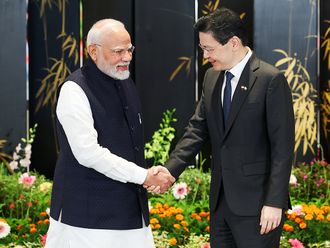"The quality of mercy is not strained/It droppeth as the gentle rain from heaven upon the place beneath?" - Shakespeare's Merchant of Venice
But what about the quality of another emotion: Joy? Does it come packaged as one A-quality brand, or can it be found in differing strengths? Unlike mercy, I'm convinced that joy bears a myriad shades and textures rendering a precise classification virtually impossible.
The joy of the mother-in-law (probably the only instance of "invisible joy") on being told that so-and-so is the man her daughter has lost her heart to, has been well documented and generalised.
One step up is the "fake joy" a mother displays when her 15-year-old son comes home, with the whiff of cigarette on his breath and says, "Hi, mum, meet my friend, David."
The "fake joy" is directed at David, who the mum is convinced is leading her son astray.
It's fortunate his dad isn't here, she thinks, beneath the forced joyousness, there's no telling what he'll do. Which is true, really, because the boy's father himself began smoking at 15, so there's a possibility that dad's joy might be even greater (joy, because his son didn't get to break his father's record and hold off for longer!) Which then reveals the unpredictable, "it can come out of the blue" nature of joy.
General-like utterance
Fancy standing nervously before your dad, awaiting the general-like utterance of that peremptory command: "You're grounded!", only to have him throw his arms out and enfold you in a manly bear hug.
Such a situation brings forth "confused joy" because the youngster, while mighty relieved, has no idea what he's done to evoke such a response from his father. But one is expected to feel joy on being hugged, so one goes for it.
And so it goes ? up the gradation ladder, step by step, a different kind of joy for each situation, from the barely visible to the barely concealed.
It's the barely concealed version that viewers in Australia have been privileged to watch quite consistently of late, ironically and sadly, after hostilities broke out between Israel and Lebanon.
Twenty-five thousand Australians (most of them, admittedly, of Lebanese origin) found themselves stranded in Lebanon where they had been visiting relatives, taking a winter break from Down Under to enjoy a Mediterranean summer.
One can imagine the excitement with which they boarded the planes out of Sydney. One finds it hard to imagine how easily that excitement, that moment of rapture when meeting loved ones after so long, can be transformed as a new set of imperatives is imposed on the situation.
The imperatives being: staying alive and getting out of the combat zone safely, preferably back home to Australia.
Where's the joy in this case? It's no fun ducking into safety shelters, bundling up the children, waiting nervously on edge for the next air raid siren, ducking out again when it's safe, contacting the embassy, then, in some cases, taking the long, hazardous bus trips to the border, in a convoy exposed to the "eyes in the sky", waiting, praying. Then arriving at the harbour only to find the ship that was destined to pick up Australian citizens was double booked and is now offering its services to Canada!
Where's the joy in being left stranded on the water's edge, watching others embark? Even when a ship does arrive and passage is available, the long voyage to Cyprus is undertaken with bated breath. If there's any joy it's as invisible as a mother-in-law's.
When the flight touches down in Sydney, however, it's remarkable, almost miraculous, how the transformation takes place, how the joy that was there all along, bottled, suddenly bursts free and overflows, unstoppably.
This is what I think is "undiluted" joy, the quality that, somehow, can only manifest itself, I think, after one has been through an intense period of darkness. For all those in the grip of war, I hope this theory holds good for you too.
Kevin Martin is a journalist based in Sydney.









